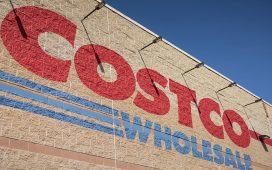Losses at Ocado rose to half a billion pounds as the UK retail and technology group invested more in international expansion and shoppers tightened their belts in its home market.
The company said on Tuesday that its pre-tax loss rose to £501mn in the year to last November, up from £177mn the previous year and worse than analysts’ consensus of £429mn.
Ocado runs an online supermarket in the UK in partnership with Marks and Spencer, and also sells its technology and robotic warehouses to other retailers around the world to enable them to sell goods online.
Last year, sales at the UK retail business dropped 3.8 per cent to £2.2bn as shoppers bought fewer items on each visit. Retail losses were £4mn, down from £150mn profit in 2021.
Ocado said that customers bought on average 46 items per order during the period, down from 52 in 2021, and the same amount as before the pandemic. The number of active customers increased 13 per cent to 940,000 from 832,000 the previous year.
The online grocer also vowed on Tuesday to “compare” the prices of 10,000 of its items to those of Tesco, the UK’s largest supermarket, and give customers money off their next shop if Ocado products are more expensive, as all leading chains fight to gain new shoppers and retain existing ones amid the cost of living crisis.
“If we’re matching thousands of products against Tesco and Tesco are matching the few hundred that are relevant against Aldi or Lidl, then in effect . . . we’re all the same on those kinds of products,” said Tim Steiner, the group’s chief executive and co-founder.
Steiner also said that Ocado was not experiencing vegetable shortages after five leading supermarket chains began rationing the sale of tomatoes, cucumbers and peppers in the UK.
“We definitely have tomatoes on the shelves at the moment,” he said. “We don’t have people running in to buy tomatoes and running out.”
Ocado Group is expanding its grocery delivery software offering to retailers around the world, including in Japan, South Korea and Australia.
The company has invested in technology and opened sites for partners worldwide, but that expansion led to a big increase in the depreciation charge, which also contributed to the increased loss.
Ocado shares, which have lost more than three-quarters of their value since their pandemic-induced high in September 2020, dropped another 9 per cent in early trading in London, sending it to the bottom of the FTSE 100 on Tuesday.
Analysts at Shore Capital described the results as “awful”, adding that given further losses are expected this year “one cannot yet see the rainbow, never mind any pot of gold”.
“Over the last year, every company has had its business model tested by a combination of macroeconomic and geopolitical headwinds,” said Steiner. However, he added: “We’ve been in tough times before, we’ve grown market share and volume in those tough times.”









